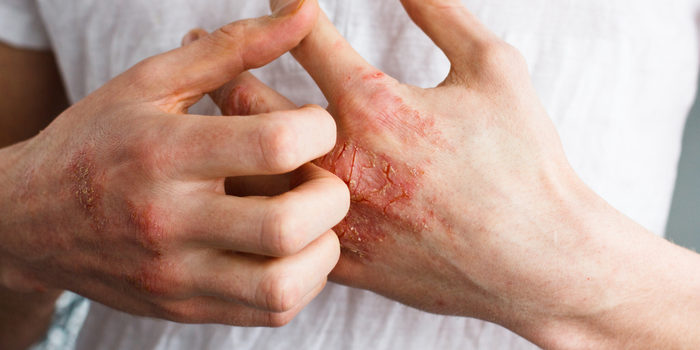


The worst of eczema’s symptoms result in serious itching, redness and scale-like skin. If you or someone you know has been diagnosed with eczema, you’re likely wondering about the symptoms, the causes and the treatments available for the condition. Today, we’re going to delve into exactly that.
Eczema: Symptoms, Causes and Treatments
Symptoms
Eczema is a skin condition, and is autoimmune. Its symptoms include scale-like, reddish plaques that are quite itchy and uncomfortable. There are actually several different types of eczema. They include atopic dermatitis, contact dermatitis, dyshidrotic eczema, nummular eczema, seborrheic dermatitis and stasis dermatitis.
Commonly, the red patches of skin appear to “boil over” during flare-ups. In fact, the word eczema comes from the Greek word, meaning “to boil over”. These uncomfortable patches aren’t contagious, and are a result of over-active skin cells producing too many copies of themselves in isolated locations.
Causes
While it’s not entirely known what causes eczema to occur in people, flare-ups can be predicted. For instance, it’s easy to tell that when skin is irritated, kept wrapped up or rubbed constantly, such as the skin on the foot inside a shoe, it can cause a flare-up. While such conditions won’t cause someone to suddenly develop eczema, it could result in a flare-up for those already diagnosed.
Treatments
There is, sadly, no cure for eczema. While it occurs commonly in young children and babies, eczema isn’t solely a children’s issue. Some people never grow out of the condition, while some others do so easily. It depends, entirely, on the individual and their genetics.
There are a few things you can do to mitigate the symptoms of eczema, however. Namely, using over-the-counter drugs that help to mitigate inflammation can be a good course of action. Likewise, daily bathing and moisturizing is highly advised, especially around the site of the most common flare-ups.
Wearing loose, breathable clothing is also a good call. Tight-fitting, poorly breathable clothes are not ideal for people with eczema, as they can lead to increased flare-ups. If your job requires you to wear certain clothes or shoes, see if you can get an exemption for medical reasons.
Final Thoughts
Eczema isn’t life-threatening, but it is uncomfortable. Learning the triggers that set off your eczema can be a really important way to keep yourself from experiencing an uncomfortable flare-up. Taking anti-inflammatory over-the-counter medication, wearing breathable clothes and regularly moisrturizing problem regions are all highly advised, as well.










